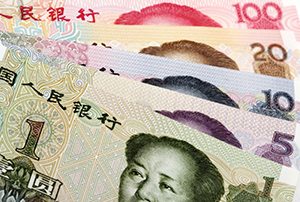Chinese efforts to make the yuan an international currency have been checked by banks and consumers.
Data from SWIFT, the global system that coordinates international payments between banks, showed popularity in the yuan waned in the first two months of 2015.
In December, payments in yuan topped out at a record 2.17% of all international transactions.
However, in the following months, the yuan lost favour and dropped back to 1.81%.
The problem for the yuan seems to be that the currency is reliant on Hong Kong handling more than 70% of all transactions, although London and Singapore and making plays to expand the reach of the currency.
Although the yuan shattered a glass ceiling to join the world’s most used currencies in 2014, the success has failed to last.
The yuan also has a long way to go to join the top table.
Leading world currencies
According to SWIFT, the breakdown for the top interbank transactions by currencies is:
- US Dollar – 43.09%
- Euro – 28.95%
- British Pound – 8.57%
- Japanese Yen – 2.75%
- Swiss Franc – 1.85%
- Canadian Dollar – 1.82%
- Chinese Yuan – 1.81%
The Chinese government has desperately dismantled barriers to yuan trading in recent years.
The next move is a bid to have special drawing rights conferred on the yuan by the International Monetary Fund.
These rights allow central banks to hold yuan as a currency reserve.
Agreement to have special drawing rights depends on freedom of access to a currency market and the share of world trade China takes.
Investment ban lifted
China is the world’s largest export country, but the yuan is still under lock and key of the Chinese central bank,
Efforts are underway to attract investors by abolishing controls on yuan holdings.
Until last week, only central banks and sovereign wealth funds could hold more than US$1 billion of yuan. The lid was lifted on the ban for Fidelity Investments in Hong Kong, which opens the door for foreign investors to hold Chinese shares and bonds.
“The fact that countries outside of Hong Kong, which is of course part of China, shows the yuan is becoming more attractive to foreign banks and investors,” said Michael Moon, head of payments Asia-Pacific at SWIFT.
“As with any currency, the yuan will fluctuate across markets but as other exchanges come on line, the yuan will grow stronger and the current figures augur well for China.”
